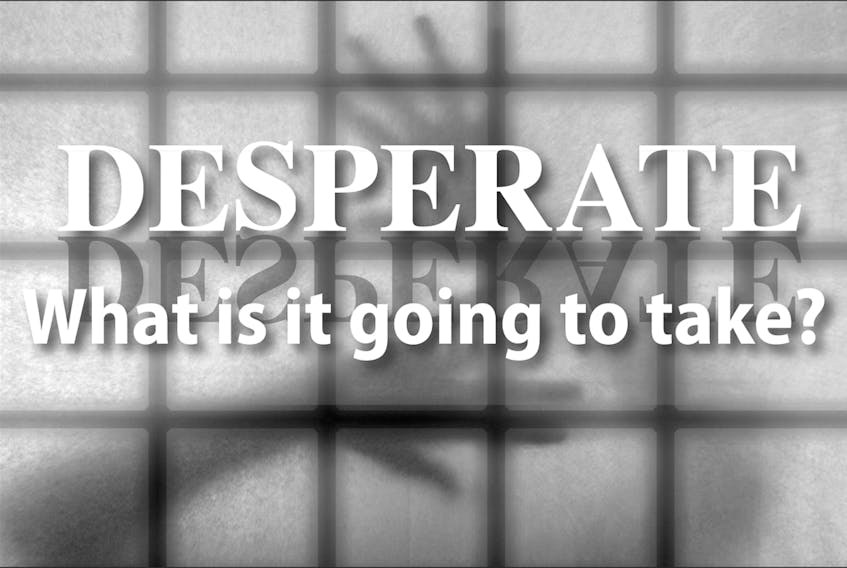TRURO, N.S. - On the inside, every day is a repeat of the one before.
A never-ending cycle of rejection.
It’s like being trapped in a nightmare, screaming in the middle of a crowded room, yet no one sees or hears you.
“It’s a fighting battle,” Shelly says. “They keep telling me that I am getting services but I’m not. The police are my witness. It’s a complete vicious cycle.”
It’s not the first time Shelly (not her real name) has shared her story since arriving in the Truro area in May. But after months of repeatedly trying to get help for her mental-health issues, she wants to tell her tale once more in the hopes that this time, perhaps, it will catch the attention of someone with the power and will to actually stand up and act.
“I feel intimidated. I feel lost. I don’t know where to turn,” she says.
“I think that our health-care system is broken. I think that our health care has been pretty much going downhill.”
Shelly says she was diagnosed long ago with borderline personality disorder and premenstrual dysphoric disorder, which creates mood swings and can turn a happy, sunny day into a downward spiral of dark despair in a moment.
“It impacts you in all ways, it impacts your mental health, your emotional, physical too,” she says.
Bottom line, she wants helps. Needs help. Demands help. And when she doesn’t get it, she often reacts in ways that ultimately don’t help her cause.
“I want help,” she says, despairingly. “But because they keep putting up barriers. They’re putting walls up. They’re closing doors… it becomes a point where I want to explode. I verbally attack.”
Shelly says she has gone to the Colchester East Hants Health Centre in Truro looking for help more times than she can recall. Sometimes it is of her own volition, sometimes she is taken there by police officers after she has once again threatened to harm herself.
Truro police have essentially been her only allies, she says, but the help they can offer is limited – beyond moral support and taking her to the hospital when things get out of control, there is little else they can do.
And each trip to the hospital is a repeat of the visit before, Shelly says. She is triaged, assessed and sent on her way.
She has attempted suicide before and continuously threatens to harm herself. But ultimately, she says, that is not what she wants.
“I have been in that dark spot where my self esteem was so low that I was just in a dark dark place, where I just wanted to curl up in that little ball.
“I just didn’t want to live to see the next day. I just wanted to curl up and die; I just wanted to end it,” she says.
“Deep down, no I don’t. But I’m crying for help.”
Her primary hope is to have access to ongoing health care and to be connected with a family doctor who can prescribe whatever medications deemed necessary for her well-being, and then to be there to monitor her progress. She would also like to be able to speak with a professional, one on one, to deal with her mental health concerns.
“The talking, to get things off my chest is helpful,” Shelly says. “I need a psychiatrist to work with me. I may need to be on medication to (control) my mood swings, because my moods are up and down. They are like a yo-yo.”
She describes herself as a “vulnerable hurting woman” whose “emotions are out of control because they are not regulated.”
But over and over again, Shelly says, she continues to be turned away from the facilities and people that should otherwise offer hope.
Beyond the front staff at the hospital, Shelly says she has made her pleas known to higher officials at the health authority; to local MLAs; to the health minister’s office; to the premier’s office; to the provincial ombudsman, only be told at every turn: “We can’t help you…”
Days ago…
On Tuesday, Shelly called the Truro News to say she had finally given up on trying to get help in Truro and was on a bus to Halifax.
“I haven’t eaten in four days,” she said. “If I harm myself that is my choice.”
A short while later she called again to say she had been taken to the QEII by Halifax Regional Police, but that she still wasn’t getting anywhere, and her anger and frustration were once again reaching a boiling point. Then, after 12 hours of sitting in the emergency room at the QEII, Shelly says she was told because she doesn’t live in that jurisdiction, there was nothing they could do. She would have to return to Truro for help – help she hasn’t been able to get here.
“Nobody’s listening. Nobody’s helping me. I’m fed up,” she said. “Where do you go, where do you turn?”
Sometimes, she says, she just wonders if she should force matters by doing something to put herself in front of the court.
“So that if it takes the police to have to charge me, I can go in front of a judge and tell the judge that this is what the health-care system is doing to me. Because they have driven me to this extreme point to have to make a threat against the system so that it gets to the court…” she says.
“I’m frustrated. Yes, I’m very frustrated. I’m at the point I just don’t know. I’m very lost, and no help.”
Resources
Know the risk factors and warning signs for suicide
How to get help:
If you or someone you know needs immediate mental health help, go to the nearest hospital, call 911, or call Nova Scotia’s mental health crisis line: 902-429-8167 or toll-free: 1-888-429-8167
Additional services: www.nshealth.ca/mental-health-addictions www.ementalhealth.ca/Nova-Scotia/
Kids Help Phone: 1-800-668-6868
Crisis Services Canada Online: crisisservicescanada.ca Phone: 1-833-456-4566 or text: 45645
NOTE: Below are Harry Sullivan's stories about this Shelly's case, published in the Truro News's print edition Aug. 16.
Nowhere to turn : Lack of mental health services bring frustration for trauma victim
TRURO, N.S. - A Truro woman who moved here several months ago, now wants to leave because of what she views as a lack of mental health and other services available locally.
"I'm not happy in a rural area," said the 43-year-old woman, who asked her name not be used. "I want to be back in Halifax. There's more opportunities and resources."
The woman - referred to here as Shelly - moved to Truro from Yarmouth for more affordable housing. But without a family doctor, her attempts to receive one-on-one outpatient counselling services for mental health issues and referrals for care by specialists for other physical health issues, such as epilepsy, have been in vain. That's left her frustrated and discouraged.
"It's a vicious cycle here," she said. "It's like feeling like your voice is not being heard, feeling like you are in the dark."
Shelly said services she seeks are available in Yarmouth and Halifax, where she also lived for a time. But because of the cost of living in those areas, she had hoped to improve her circumstances by moving to a less-expensive community.
She now feels the move has backfired because, without additional help from social services she cannot afford to move away.
Shelly said she has been dealing with trauma and abuse since childhood, including being abandoned by her parents who divorced when she was a baby.
Her early years were spent being shuffling between her mother and a variety of foster homes until age 11 when she was named a ward of the court by community services.
That shuffling continued, she said, from age 11 until 19 when she was transferred between various institutions, including the former Nova Scotia Youth Training Centre in Bible Hill and the former Nova Scotia
School for Girls (later renamed the N.S. Residential Centre) in Truro, until eventually moving on to a regional rehabilitation centre in the Halifax area.
"I came from a very traumatic background," she said. "I've been through mostly every form of abuse you can think of, from sexual abuse to mental trauma back to the time when I was a baby."
Among physical ailments, Shelly said she has been diagnosed with cognitive delay, borderline personality disorder, depression and anxiety - factors she attributes to her lack of ability to cope with her "emotional baggage."
"I struggle with coping," she said. "I don't cope. I don't deal with the internal pain and the baggage I carry from my trauma, from my background."
Programs are 'evidence-based' official says
TRURO, N.S. - Justified or otherwise, Shelly feels "singled out" in not being able to receive the mental health help she requires, given it was available in a smaller community like Yarmouth.
But Lee Johnson, manager of outpatient Mental Health Clinical Services at the Colchester East Hants Health Centre, says similar services do exist here.
"For clients that don't have a family doctor we don't discriminate against that at all. They don't require a doctor's referral to get into the mental health program," she said. "They can self-refer through our central intake and we would complete a full intake with them and determine if they meet the criteria for mental health services and would process them from there on an urgency basis. What we try to do here is provide the best service most suited to their needs. So, if that was one to one, then that would be the service we'd provide."
Shelley, however, said that is not what she has experienced.
Even the correspondence she has received from Nova Scotia Health Authority officials has left her frustrated because it does not portray a truthful picture, she said. In one letter from an official at Mental Health and Addictions at the Colchester East Hants Health Centre, the writer acknowledged while it was "collaboratively decided" that a group therapy program that had been recommended was not suitable for her, the person went on to say: "We are pleased to hear you have found supportive counselling in the community."
But Shelly said that is not the case and she does not understand how it could have been perceived as such. Likewise, for another letter from the same department which states that she "... is currently accessing services through Mental Health and Addiction Services as well as the Emergency Department and multiple services in the community."
In reality, she said, during a recent visit to the hospital she was escorted into a room by a nurse practitioner and told someone from the mental health crisis response team would be coming to see her.
"Nobody showed up while I sat there from 10 o'clock to 6 o'clock," she said. "Nobody came down to see me from the mental health department."
The only doctor she did see after waiting about eight hours, she said, was a doctor from the emergency department who assessed her, spoke with her for a few minutes and then sent her home.
"They're saying I'm getting these services but I'm not getting these services," Shelly said.
"Because they don't offer these services is what I'm being told."
Once again, however, her information does not correspond with the way the system is supposed to work, according to Johnson.
"I can assure you no one is denied mental health services," she said. "We would determine the best services for the client."
All their programs are evidence-based, Johnson said but sometimes what a client thinks they need and what the medical experts determine for them, may not coincide.
"But we are trying to match the client with the program that gives them the best outcomes," Johnson said. "What we do is a full risk assessment on all of our clients and determine what their level of risk is on presentation."
People who visit the hospital with mental health concerns who are deemed to be at high risk, are seen before those considered to be less of a threat to themselves, she said.
"It is up to the emergency doctor whether or not they do consult our crisis department. There are clients who come in with mental health and addiction issues that do not require our crisis people to see them," Johnson said. "If we do get a consult though, we do go down and see the client and do a full risk assessment and what have you for them."
Resources
Know the risk factors and warning signs for suicide
How to get help:
If you or someone you know needs immediate mental health help, go to the nearest hospital, call 911, or call Nova Scotia’s mental health crisis line: 902-429-8167 or toll-free: 1-888-429-8167
Additional services: www.nshealth.ca/mental-health-addictions www.ementalhealth.ca/Nova-Scotia/
Kids Help Phone: 1-800-668-6868
Crisis Services Canada Online: crisisservicescanada.ca Phone: 1-833-456-4566 or text: 45645









